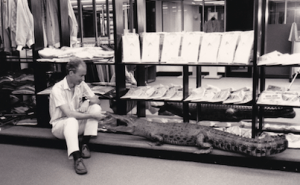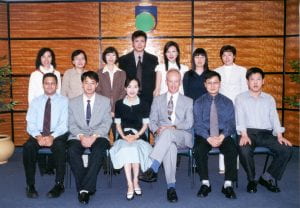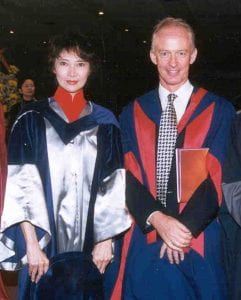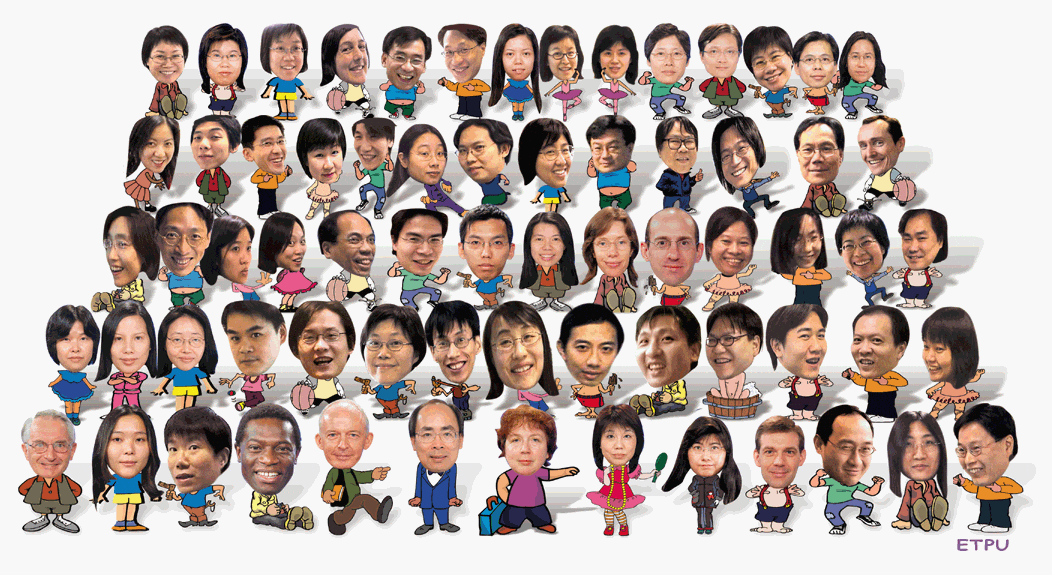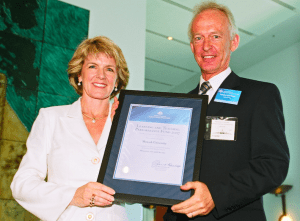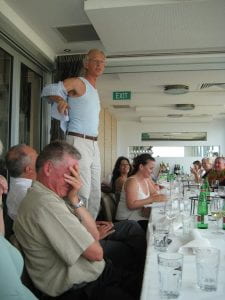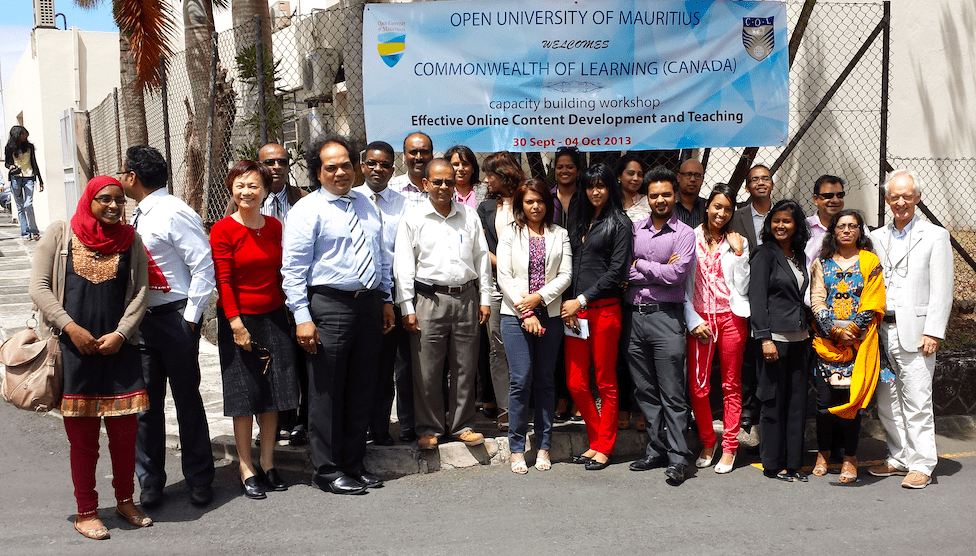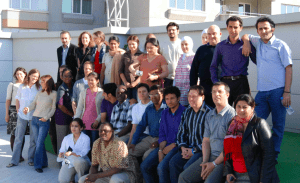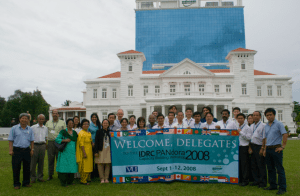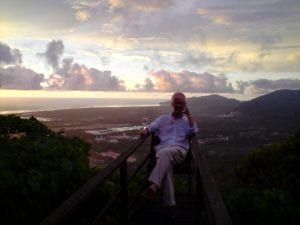In my early 30s, I didn’t have a passport and had never been overseas. It was 1984, we had a young family, and were keen to take off somewhere … anywhere. I viewed enviously a business studies teacher at Hobart Technical College who had obtained a position in the Seychelles – such an amazing move seemed well out of reach. But then …
13. HK Polytechnic – Programme Development Officer (1985) An English friend living in Launceston had worked for a while at Hong Kong Polytechnic, and let me know that a job was available there in the Education Technology Unit. I got the details and submitted an enthusiastic application. Granted an interview, I was flown to Sydney to meet with the Deputy Director of the Poly, along with an Australian senior academic, Bob Ross. It was certainly unusual, in that we sat in the cafeteria and chatted amiably enough before the flight to Hong Kong was called and it was all over. The wait was long, but some months later I received a job offer for a two year contract, and the excitement began. I was a bit twitchy about cutting all ties, but through slightly devious means I was able to get two years leave without pay.
It was a big break, especially from our families. And we had to sell our house, arrange storage for possessions we wanted to keep and, of course, obtain passports. That became an issue as our departure date drew near, as we were sure to fly out on a Saturday, and by the week before they still hadn’t arrived. Numerous frantic phone calls were made, including a nasty conversation with a snooty Pom based in Canberra. To no avail, they were still not here by our departure date and we were delayed until a few days later – not a good start to a new job.
This was the job that changed out lives. We gradually settled in to the hectic pace and lifestyle of Hong Kong, and the children loved their school. The work was challenging but rewarding, so much so that after the initial two years we stayed on … for seven years (see glimpses in YouTube videos at A, B and C).
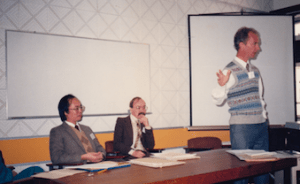 We lived in Polytechnic quarters, Pak Tak Yuen, out at Shatin in the New Territories, a pleasant and supporting community. It was dubiously titled ‘Sin City’ by some wit, due to its reputation for somewhat wild parties, but mostly we lived a pretty normal life among similar families from various parts of the world, the majority being from the UK and local Chinese families with overseas passports.
We lived in Polytechnic quarters, Pak Tak Yuen, out at Shatin in the New Territories, a pleasant and supporting community. It was dubiously titled ‘Sin City’ by some wit, due to its reputation for somewhat wild parties, but mostly we lived a pretty normal life among similar families from various parts of the world, the majority being from the UK and local Chinese families with overseas passports.
I enjoyed the work, which was varied, with a focus on developing educational materials for student use as the Poly started to develop self-learning courses. For quite a while I was closely involved with the Institute of Textiles and Clothing, working on a variety of subjects for Certificate in Textile and Clothing for supervisors in the clothing industry.
 It was a nice small group to work with at Deakin, with my boss Hugh Moore a particularly good person to learn from. He gave us enough resources and freedom to pursue ideas and innovations in learning technology, so it was professionally satisfying. I designed and developed a course for the Finance Sector Union, producing study units of which I was pretty proud, both in the content and the design (plenty of excellent graphic design and production backup). But as a family we didn’t really settle into Geelong, and the children weren’t happy at the private school we’d chosen for them.
It was a nice small group to work with at Deakin, with my boss Hugh Moore a particularly good person to learn from. He gave us enough resources and freedom to pursue ideas and innovations in learning technology, so it was professionally satisfying. I designed and developed a course for the Finance Sector Union, producing study units of which I was pretty proud, both in the content and the design (plenty of excellent graphic design and production backup). But as a family we didn’t really settle into Geelong, and the children weren’t happy at the private school we’d chosen for them.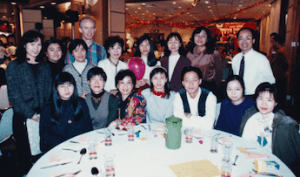 It was a great job with a talented and lovely team of people, comprising educational designers, editors, graphic designers and others. It was also a time of progress and change at the OUHK, as we moved from temporary accommodation in an office building in Mong Kok on to a purpose-designed campus in Homantin. The course materials we developed were of high quality, as we worked with excellent academics from around the world as well as our in-house academic colleagues.
It was a great job with a talented and lovely team of people, comprising educational designers, editors, graphic designers and others. It was also a time of progress and change at the OUHK, as we moved from temporary accommodation in an office building in Mong Kok on to a purpose-designed campus in Homantin. The course materials we developed were of high quality, as we worked with excellent academics from around the world as well as our in-house academic colleagues.17. OUHK – SCD/CRIDAL (2001) Believe it or not, when I made enquiries back at the Open University of Hong Kong, I discovered that my position hadn’t been filled! Either I’d been so good that I was irreplaceable, or no-one had noticed I’d left. Jokes aside, I was able to resume my previous position as Senior Course Designer in the Educational Technology and Publishing Unit (ETPU), and happily headed back to Hong Kong for the third time.
Again, the work was interesting, varied and challenging, especially as after a few months I was invited to head up CRIDAL (Centre for Research in Distance and Adult Learning) during the secondment of the incumbent to initiate the Open University of Nigeria. This was in addition to my usual duties, which wasn’t as onerous as it sounds – I was able to divest myself of some course development projects to members of the course design team.
CRIDAL consisted of a nice little team of capable staff, and we were able to advance the research agenda of the OUHK, along with running regular conferences and hosting visiting researchers from other universities (especially China). The task I enjoyed the most was the preparation of a monthly newsletter RIDALink (Research in Distance and Adult Learning Link) for all university staff, which continued for all 42 months (yes, that special number 42) I held the position.
Another highlight was being a member of the small team tasked with preparing for a World Conference of the ICDE (International Centre for Distance Education) to be hosted by the OUHK – the team comprised two Deans, myself and Prof. Jim Taylor (President of ICDE) as Chair. The conference was hugely successful, as Hong Kong is undoubtably an enticing location, and the organisational sport from OUHK staff was outstanding. Though most of the event was at the OUHK campus, it ended in a blaze of glory at the International Convention Centre, where the Hong Kong handover had taken place in 1997.
18. Monash University – head of CALT (2005) After four years we again decided to move back to Australia, and I accepted an offer from Monash to take on a few emerging educational technology projects around the university. It was quite a nice, relatively peaceful life, but didn’t last long.
Monash was looking to streamline and shake up a number of small units which all came under the umbrella of academic staff development and student support, and I foolishly agreed to head up the emerging amalgamated unit, the Centre for the Advancement of Learning and Teaching. It was something of a poisoned chalice, as the process was tortuous and painful, including a number of difficult retrenchments.
Yes, there were some fun and memorable moments, but overall it wasn’t a good fit (neither skills nor temperament) for me, especially as from memory I was on 19 committees. I remember my dismay when, in my absence, I was appointed Chair of the Graduate Attributes Implementation Working Group. This and other factors led to me resigning for a quieter life after three years.
20. UNHCR – consultant and tutor The work with CoL had introduced me to the UNHCR (UN High Commissioner for Refugees) and my connection with them continued for a few years. The initial project was the design and development of a course in writing for UNHCR (see above), which was (and continues to be) so successful that it was modified for other international agencies.
Later, I was invited to be a tutor on a subsequently developed course on data management for UNHCR field staff. I enjoyed the challenging task immensely, mostly because of the remarkable people I got to know through their participation. Most were working in dangerous localities, making it very challenging for them to complete and submit assignments (it was mostly online). Reasons for being unable to send an assignment were not of the ‘the dog ate my homework’ variety, more along the lines of being caught up by the military, or having explosions go off on the way to work. One of my proudest moments was in 2006, when one of my students won the CoL award for e-learning in challenging circumstances, whereby Col honours “students that have overcome training constraints normally present when working in areas of conflict, natural disasters, pandemics etc.”
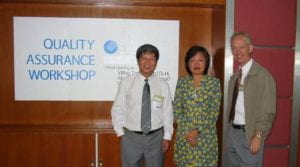 He’d set it up well, in that as the OUHK took a large slice of fees, he negotiated for us to do it for free, as long as we were given Business Class tickets to Kuala Lumpur (KL) and put up at a swanky hotel! As it turned out it was even better than anticipated, as were upgraded to First Class on the way there.
He’d set it up well, in that as the OUHK took a large slice of fees, he negotiated for us to do it for free, as long as we were given Business Class tickets to Kuala Lumpur (KL) and put up at a swanky hotel! As it turned out it was even better than anticipated, as were upgraded to First Class on the way there.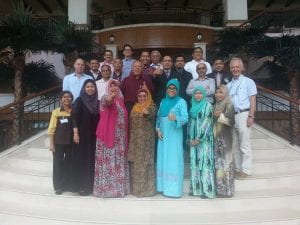 So it was that some years later I did a number of visits to run staff development events, both at OUM headquarters in KL and at a pleasant resort in the Genting Highlands. Making my job easier was the OUM coordinator of the events, Dr Safiah Yusof (centre front in the pic).
So it was that some years later I did a number of visits to run staff development events, both at OUM headquarters in KL and at a pleasant resort in the Genting Highlands. Making my job easier was the OUM coordinator of the events, Dr Safiah Yusof (centre front in the pic).The focus was increasingly on methods of designing and developing online courses, which at the time we based on Moodle software, which is highly adaptable.
22. Wawasan Open University – consultant I suppose that it’s often all about contacts, and working at Wawasan comes into this category.
Raj Dhanarajan had been President of OUHK when I first worked there, and he’d employed me as a consultant when he became head of CoL. He subsequently went home to Penang in Malaysia to help start up Wawasan, and had Tat Meng Wong as Vice-President. Over a period of years I spent time there conducting staff development workshops and associated activities, always a pleasure and privilege to work in a great setting – the campus was the former home of a leading banking family who wanted to contribute to the further education of the Penang population.
The longest stint was for about three months, which provided the opportunity for Marilyn to join me and discover the joys of the island, along with exploration of the nearby mainland and other islands, such as Langkawi. Yes, there was plenty of work to do, including a video series of tutor and course writer training.

